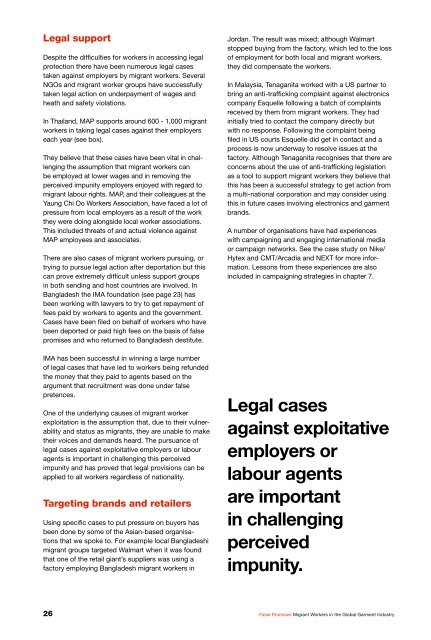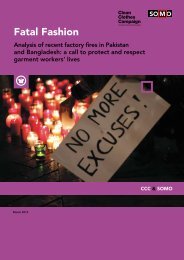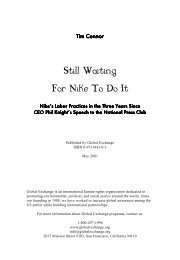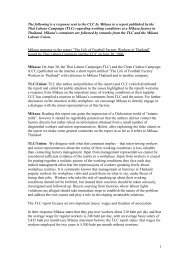Create successful ePaper yourself
Turn your PDF publications into a flip-book with our unique Google optimized e-Paper software.
Legal support<br />
Despite the difficulties for workers in accessing legal<br />
protection there have been numerous legal cases<br />
taken against employers by migrant workers. Several<br />
NGOs and migrant worker groups have successfully<br />
taken legal action on underpayment of wages and<br />
heath and safety violations.<br />
In Thailand, MAP supports around 600 - 1,000 migrant<br />
workers in taking legal cases against their employers<br />
each year (see box).<br />
They believe that these cases have been vital in challenging<br />
the assumption that migrant workers can<br />
be employed at lower wages and in removing the<br />
perceived impunity employers enjoyed with regard to<br />
migrant labour rights. MAP, and their colleagues at the<br />
Yaung Chi Oo Workers Association, have faced a lot of<br />
pressure from local employers as a result of the work<br />
they were doing alongside local worker associations.<br />
This included threats of and actual violence against<br />
MAP employees and associates.<br />
There are also cases of migrant workers pursuing, or<br />
trying to pursue legal action after deportation but this<br />
can prove extremely difficult unless support groups<br />
in both sending and host countries are involved. In<br />
Bangladesh the IMA foundation (see page 23) has<br />
been working with lawyers to try to get repayment of<br />
fees paid by workers to agents and the government.<br />
Cases have been filed on behalf of workers who have<br />
been deported or paid high fees on the basis of false<br />
promises and who returned to Bangladesh destitute.<br />
IMA has been successful in winning a large number<br />
of legal cases that have led to workers being refunded<br />
the money that they paid to agents based on the<br />
argument that recruitment was done under false<br />
pretences.<br />
One of the underlying causes of migrant worker<br />
exploitation is the assumption that, due to their vulnerability<br />
and status as migrants, they are unable to make<br />
their voices and demands heard. The pursuance of<br />
legal cases against exploitative employers or labour<br />
agents is important in challenging this perceived<br />
impunity and has proved that legal provisions can be<br />
applied to all workers regardless of nationality.<br />
Targeting brands and retailers<br />
Using specific cases to put pressure on buyers has<br />
been done by some of the Asian-based organisations<br />
that we spoke to. For example local Bangladeshi<br />
migrant groups targeted Walmart when it was found<br />
that one of the retail giant’s suppliers was using a<br />
factory employing Bangladesh migrant workers in<br />
Jordan. The result was mixed; although Walmart<br />
stopped buying from the factory, which led to the loss<br />
of employment for both local and migrant workers,<br />
they did compensate the workers.<br />
In Malaysia, Tenaganita worked with a US partner to<br />
bring an anti-trafficking complaint against electronics<br />
company Esquelle following a batch of complaints<br />
received by them from migrant workers. They had<br />
initially tried to contact the company directly but<br />
with no response. Following the complaint being<br />
filed in US courts Esquelle did get in contact and a<br />
process is now underway to resolve issues at the<br />
factory. Although Tenaganita recognises that there are<br />
concerns about the use of anti-trafficking legislation<br />
as a tool to support migrant workers they believe that<br />
this has been a successful strategy to get action from<br />
a multi-national corporation and may consider using<br />
this in future cases involving electronics and garment<br />
brands.<br />
A number of organisations have had experiences<br />
with campaigning and engaging international media<br />
or campaign networks. See the case study on Nike/<br />
Hytex and CMT/Arcadia and NEXT for more information.<br />
Lessons from these experiences are also<br />
included in campaigning strategies in chapter 7.<br />
Legal cases<br />
against exploitative<br />
employers or<br />
labour agents<br />
are important<br />
in challenging<br />
perceived<br />
impunity.<br />
26 False Promises Migrant Workers in the Global Garment Industry





